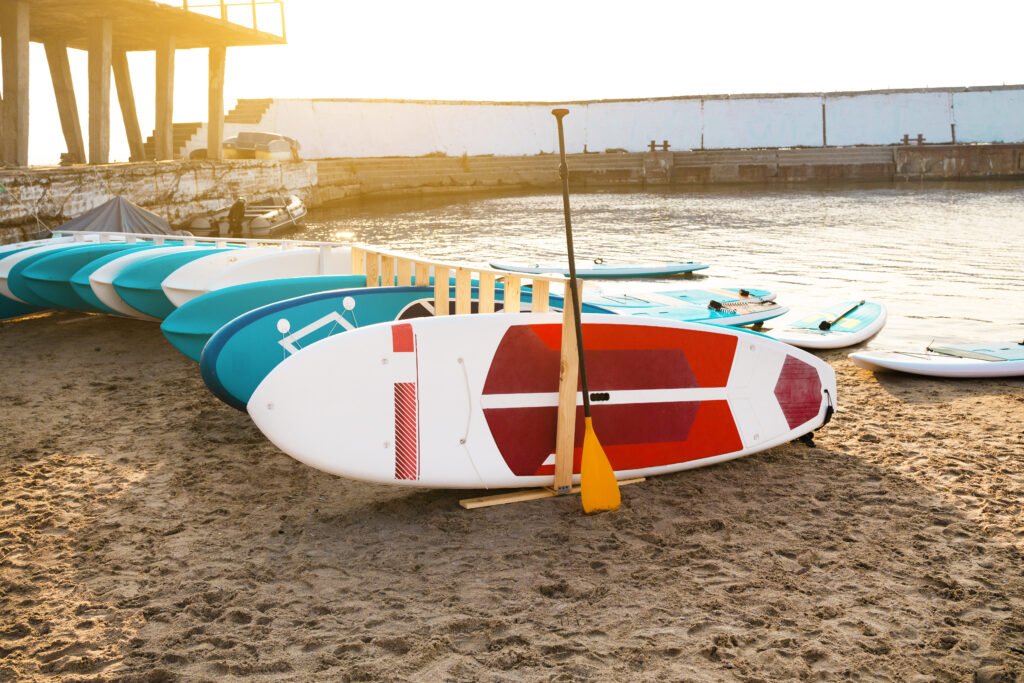Are you looking to start your own Paddle Board Rental Business? You’re in the right place! This blog will guide you step-by-step, making it easy to understand how to launch a successful paddle board rental business.
Table of Contents
- About Paddle Board Rental Business
- Why Start a Paddle Board Rental Business
- How Much Does It Cost to Buy and Start a Paddle Board
- Is It a Good Idea to Rent Out Paddle Boards?
- Types of Paddle Board Rental Business Models
- RETAIL
- MOBILE
- Steps: How to Start a Peddle Board Rental Business
- Market Research
- Create a Business Plan
- Laws and Permissions
- Equipment
- Location and Facilities
- Market Your Business
- Customer Experience
- Maintenance
- Safety Measures
- Offer Additional Services
- Conclusion: How to Start a Paddle Board Rental Business
- FAQs
About Paddle Board Rental Business
Running a paddleboard rental business can be an exciting opportunity to capitalize on the growing interest in water activities. Paddleboarding has gained immense popularity due to its accessibility, making it enjoyable for people of all ages and skill levels.
As the owner of a paddleboard rental business, you would typically provide customers with high-quality paddleboards, paddles, and safety gear for a specified rental period. The location of your business is crucial. Ideally, it should be situated near bodies of water like lakes, rivers, or the coast to ensure easy access and attract potential customers.
Additionally, offering lessons or guided tours can cater to beginners and those seeking a more immersive experience. Marketing your business can highlight the health and wellness benefits of paddleboarding, attracting fitness enthusiasts and those seeking outdoor recreation.
A well-designed website, seamless booking process, and exceptional customer service are essential for success in the paddleboard rental business. Maintaining equipment, adhering to safety regulations, and fostering positive community relationships can contribute to long-term growth and sustainability.
Why Start a Paddle Board Rental Business
Starting a paddleboard rental business holds significant earning potential for several reasons. The rising popularity of water sports and outdoor activities has created a burgeoning market for enthusiasts. Paddleboarding is a fun and accessible activity, appealing to both locals and tourists.
Furthermore, many beaches and waterfronts offer picturesque settings and ideal conditions for paddleboarding, attracting customers seeking beautiful views and recreational opportunities. The startup costs for a paddleboard rental business are relatively lower compared to other water sports ventures, making it an attractive option for aspiring entrepreneurs.
The business can be adapted to various locations, ranging from serene lakes to bustling beaches, allowing you to cater to diverse customer demographics. Building relationships with nearby tourism offices, hotels, and outdoor activity businesses can enhance visibility and drive referrals, contributing to business growth.
Overall, starting a paddle board rental business presents a promising opportunity due to a growing market, diverse location options, and relatively low startup costs, making it a potentially lucrative venture.
How Much Does It Cost to Buy and Start a Paddle Board
Starting a paddle boarding business can be a significant investment. You can begin paddle boarding for as little as $200 with inflatable options available. However, if you desire a high-quality epoxy paddle board, it will cost around $1500 to $2000.
If you’re interested in starting a paddle board rental business, be prepared to invest a substantial amount. To operate successfully, you will need to spend approximately $8000 on three high-end epoxy paddle boards and two inflatable ones.
To launch a paddle board rental business, you’ll need at least $10,000, including $2000 for marketing and other expenses. However, if you want to expand and offer a variety of paddle board options, it will cost around $35,000 for 15 paddle boards and the necessary promotional activities.
A cost-effective strategy is to consider purchasing used paddle boards or gradually scaling your rental business. While it requires dedication, renting paddle boards can be a profitable venture for the right individual.
Is It a Good Idea to Rent Out Paddle Boards?
Starting a paddle board business is more than just catching waves; it’s an opportunity to embark on an exciting journey. Imagine starting your paddle board rental business with just one board – the beginning of something unique. The beauty lies in starting anew, and you can launch a business with used paddle boards and generate income.
Imagine this: a fancy paddle board generating income every week, earning between $350 and $400. It’s true – your money coming back to you like the ocean waves. But wait, the most exciting part is how this business can grow. Growing your small investment into a million-dollar rental business. Grab your paddle, ride the wave of business, and make your dreams come true.
Types of Paddle Board Rental Business Models
The first step is to decide between a mobile or store-based business plan.
RETAIL
Setting up a retail store for paddleboarding can be challenging, but it offers several advantages. You need to find a location near a suitable body of water for paddleboarding to establish your business. Obtaining the necessary permits from the city or town is also crucial for legal operation.
You’ll need to maintain a diverse inventory of paddle boards and related accessories to cater to rental and potential sales.
A physical store provides easy accessibility for customers. People interested in paddleboarding might inquire about your services due to the store’s presence in a busy area, potentially leading to rentals or equipment purchases. In-person interactions allow for building relationships and immediate sales.
MOBILE
Many individuals find mobile businesses more convenient and cost-effective than traditional brick-and-mortar stores, eliminating the need for high rental fees. One type of mobile business that eliminates the need for a physical store is a paddle board rental service. This setup eliminates the need for rented business space, saving you money and hassle.
If you choose a mobile paddle board rental business, your first step is to purchase boards and related accessories. You’ll also need a suitable vehicle to transport your goods, enabling easy access to customers at various water venues.
One of the greatest advantages of a mobile business is the ability to operate from home. When a customer calls to rent equipment, your primary task is to quickly pack the necessary gear and deliver it to the designated lake or beach.
The ease and affordability of a mobile setup allow you to launch your business quickly and efficiently. You can focus on niche markets like paddle board rentals and better cater to customer preferences with the flexibility of a mobile operation.
Steps: How to Start a Peddle Board Rental Business
Here are step-by-step instructions on how to start a paddle board rental business:
1. Market Research
When starting a paddle board rental business, identifying the right location is crucial for success. Focus on areas with high demand for paddle board rentals. Coastal regions, lakes, and rivers are popular destinations due to their recreational opportunities.
Conduct thorough research on other paddle board rental companies in your target area. This includes analyzing their pricing strategies, services offered, and customer satisfaction based on reviews.
By understanding the existing landscape of paddle board rental businesses, a new venture can adapt its offerings to cater to local preferences, differentiating itself and achieving competitive advantage in the industry.
2. Create a Business Plan
Defining your target market is essential for launching a successful paddle board rental business. Start by identifying your ideal customer base – whether it’s vacationers, locals, fitness enthusiasts, or a combination of these groups.
Understanding your target audience will enable you to provide tailored services that meet their needs. When considering the types of paddle boards to offer, factor in whether you will stock inflatable, rigid, all-around, or touring boards.
Additionally, consider adding value-added services like guided tours, lessons, or group events to enhance the customer experience. Setting the right pricing is crucial. Ensure your rates are competitive and appealing to customers.
Explore ways to offer discounts to customers, such as group rates or loyalty programs. This can incentivize customer satisfaction and repeat business. By carefully considering these factors, you can create a robust business plan for your paddle board rental business, attracting customers and driving success.
3. Laws and Permissions
Finding your specific area of focus is a crucial step in creating a successful paddle board rental business. Start by choosing who you want to sell to – like people visiting, people who live nearby, people who are into exercise, or a mix of these.
Knowing who you are trying to help will help you give better service that fits their needs. When thinking about the paddle boards you will provide, think about the different kinds like inflatable, rigid, all-around, or touring boards.
Also, consider adding more services like guided tours, lessons, or group events to make the overall customer experience better. Setting the right prices is essential; it’s crucial to have rates that are competitive and appealing.
Discover ways to give customers lower prices, like for groups, members, or loyal customers, to make them happy and come back more often. By carefully considering these things, you can create a good business plan that will attract the people you want to reach and make your paddle board rental business successful.
4. Equipment
To operate a successful paddle board rental business, it’s essential to have a diverse range of paddle boards to cater to customers with varying skill levels and preferences. Offering boards suitable for all skill levels can attract a wider customer base, increasing revenue potential.
It’s also crucial to invest in high-quality paddles and safety gear. Ensure customer safety by providing sturdy paddles and life jackets to comply with safety regulations. Furthermore, careful consideration should be given to transportation logistics.
Develop a plan for transporting paddle boards, paddles, and safety gear to and from the rental location. This includes selecting suitable vehicles and ensuring secure storage. This contributes to providing a reliable and efficient rental service, enhancing customer satisfaction and repeat business.
5. Location and Facilities
When starting a paddle board rental business, selecting a prime location near the water is essential. This ensures easy access for customers to enter and exit the water with ample space. Choosing the right location can significantly enhance customer satisfaction and contribute to business success.
Additionally, it’s crucial to have a secure storage facility for paddle boards when not in use, preventing damage or theft. This ensures the longevity and condition of the paddle boards, contributing to customer satisfaction.
Furthermore, it’s beneficial to provide changing rooms and restrooms at the rental location for customer convenience and comfort. These amenities enhance the overall customer experience and encourage repeat visits.
Moreover, having a small shop selling paddle board accessories can generate additional revenue for the business, as there is a high demand for these products. By offering a welcoming atmosphere and a diverse range of services, a paddle board rental business can become a popular destination for water sports enthusiasts, contributing to business growth and market success.
6. Market Your Business
In today’s digital landscape, every business needs a robust online presence. One effective strategy is to create a professional website that serves as a virtual storefront, showcasing your offerings.
This enables potential customers to easily learn about your services. Additionally, utilizing social media platforms can help you reach a wider audience and highlight your unique offerings.
Building strong relationships with other businesses is crucial for business growth. Collaborating with nearby hotels, resorts, and tourism offices can be mutually beneficial. Cross-promotion can enhance visibility for both parties, attracting more customers.
Furthermore, implementing targeted promotions can help attract and retain customers. Offering early bird discounts, group rates, or seasonal specials can incentivize customers to choose your services over competitors, encouraging repeat business and contributing to business growth.
7. Customer Experience
To establish a successful business, it’s essential to have effective training programs for new staff members seeking to enhance their skills. These training sessions should provide basic instructions for beginners and also cater to those looking to develop advanced skills.
Prioritizing customer service is paramount, as it helps build a strong reputation and fosters customer loyalty. It also leads to positive reviews. Gathering and analyzing customer feedback is essential to this process.
Businesses can improve by listening to customer insights and making adjustments to enhance their services. This feedback loop helps drive continuous improvement and provide exceptional customer experiences.
8. Maintenance
Regularly inspecting and maintaining your equipment is crucial to ensure it remains in optimal condition. This involves conducting routine inspections and maintenance procedures. Proactive maintenance allows you to identify issues before they escalate, minimizing the risk of unexpected breakdowns.
It’s also essential to have a robust system for addressing equipment issues promptly. This system should include an easy way to report problems and a dedicated team or service provider to address them quickly. Timely equipment repairs ensure its longevity and smooth operation, contributing to efficient operations and overall business success.
9. Safety Measures
To ensure customer safety in the water, it’s crucial to provide clear safety guidelines before they engage in any water activities. This approach not only enhances understanding but also equips customers with the necessary information to handle potential challenges.
Clear and concise communication is vital when it comes to safety equipment usage, water conditions awareness, and designated areas: Furthermore, it’s essential to establish robust emergency response plans.
These plans should be readily accessible, clearly communicated, and fully understood by both staff and customers. Having a clear emergency plan enables swift and organized responses, minimizing harm and promoting a safe and enjoyable water experience.
10. Offer Additional Services
To enhance your business appeal and reach a wider audience, offering additional services can be a strategic move. Consider adding complementary water activities or collaborating with nearby businesses to provide a more comprehensive customer experience.
This expands your service offerings and attracts individuals with diverse interests.
Furthermore, it’s essential to explore long-term growth opportunities for your business. If your business is thriving, opening new locations in different areas can be a viable option. This involves conducting market research, identifying suitable expansion locations, and developing a plan for seamless growth.
Expanding your business geographically can help you tap into new customer bases, enhance brand recognition, and contribute to overall business success.
Conclusion: How to Start a Paddle Board Rental Business
In conclusion, starting a paddle board rental business presents a fantastic opportunity to capitalize on the growing water sports industry. This guide has provided a comprehensive overview of how to start a paddle board rental business, covering market research, business plan development, equipment management, marketing strategies, and customer engagement.
Highlighting the importance of adaptability and safety, the guide not only addresses financial aspects but also emphasizes the joy and satisfaction of introducing people to the exciting sport of paddleboarding. This venture promises to deliver exceptional service, strategic growth, and continuous improvement.
It will achieve success and customer satisfaction by fostering a community that embraces water activities. Individuals seeking to start a paddle board rental business are encouraged to take the leap, overcome challenges, and embark on their journey towards a thriving business.
FAQs
What Is A Paddle Board Rental Business?
A paddle board rental business is where you rent out stand-up paddle boards to individuals or groups for a designated period. People can enjoy paddling on various bodies of water, such as lakes, rivers, or oceans.
How To Start A Peddle Board Rental Business?
Start by understanding the regulations in your area, obtaining the necessary permits, and finding a suitable location for your business. Invest in high-quality paddle boards, safety gear, and marketing strategies. Create a user-friendly rental process and ensure your staff is trained to assist customers and maintain water safety.
What Equipment Do I Need To Start A Paddle Board Rental Business?
You will need paddle boards, paddles, life jackets, leashes, and a secure storage facility. Additionally, you may need a vehicle to transport boards to different locations, such as a trailer.
How Do I Choose A Location For My Paddle Board Rental Business?
Choose a location with high foot traffic, such as a beach, lake, or tourist spot. Ensure the site has easy water access, ample parking, and complies with local regulations.
What Legal Considerations Should I Be Aware Of?
Ensure you research the regulations and laws in your area regarding starting a business that rents out boats and other watercraft. Obtain the necessary permits and insurance to protect your business and customers. Implement safety measures and ensure adherence to water safety regulations.
How Can I Attract Customers To My Paddle Board Rental Business?
Utilize both online and offline marketing strategies. Create a user-friendly website, leverage social media platforms, offer special deals, and collaborate with nearby businesses. Offer introductory lessons or group discounts to attract new customers.
How Should I Price My Paddle Board Rentals?
Research nearby competitors and consider factors such as service quality, location, and offerings. Offer fair and transparent pricing. Provide hourly, daily, or package rates to cater to diverse customer needs.
How Can I Ensure Customer Safety?
Provide clear and detailed safety rules and tips. Ensure all customers wear life jackets and use appropriate safety equipment. Inspect and maintain your paddle boards regularly. Consider offering beginner paddle boarding lessons or partnering with instructors to teach water safety.
How Do I Manage Reservations And Bookings?
Invest in a booking system for your website to streamline reservation management. Clearly outline your operating hours, pricing, and booking process on your website. Respond promptly to customer inquiries and confirm bookings via email or text.
What Are Some Additional Services I Can Offer To Enhance My Business?
You can offer guided tours, plan group events, host paddleboard yoga classes, and partner with local businesses to create special packages. Offer a variety of services to appeal to a broader customer base and create unique experiences.







